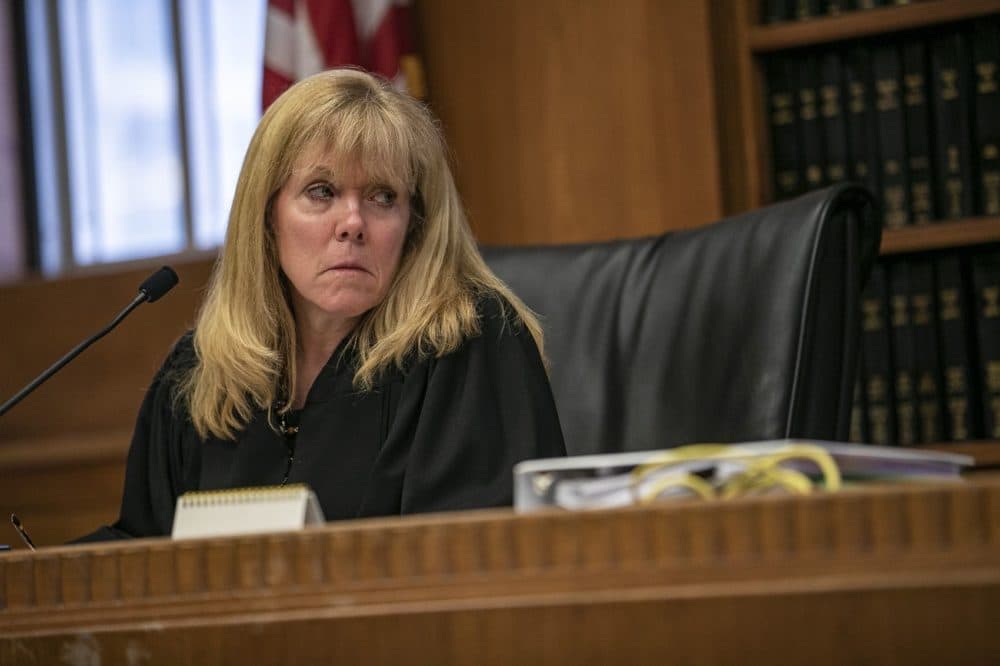Advertisement
Closing Arguments In Souza-Baranowski Prisoners' Lawsuit Against DOC Heard

An inmate at Souza-Baranowski Correctional Center told a judge that guards would handcuff prisoners before tasing and beating them during a recent lockdown at the maximum security prison.
At a hearing in Suffolk Superior Court on Wednesday, Ricardo Arias testified the actions were a form of retaliation following a violent incident last month that left four guards with injuries.
Judge Beverly Cannone will soon decide whether the state Department of Correction violated prisoners' rights — including the right to counsel and access to legal documentation — in the aftermath of the Jan. 10 incident. In a hearing last week, Souza Superintendent Steven Kenneway defended actions taken during the lockdown, saying they were in line with existing guidelines.
Counsel for the DOC said the court proceedings were moot because phone privileges have been restored and lawyers were only barred during the lockdown for their safety.
Arias testified despite objections by DOC attorneys, who argued he was not on the original complaint and therefore should not be heard in court Wednesday.
Arias, who is housed on the south side of the prison, said he heard about the alleged assault that happened on the north side on Jan. 10. He remembered being given a t-shirt, boxers, socks and shower shoes and being handcuffed and escorted to the showers.
"I saw people across from my cell tased and maced while they were cuffed behind their backs," Arias told the court. "We were yelling out that they were supposed to have cameras when they extract people from their cells."
Arias explained that he usually goes to the prison's library to do legal research to assist his defense team in his appeal. During the lockdown, he said he didn't have access to it.
Arias testified that conditions during the lockdown didn't improve until prisoners filed the complaint.
Advertisement
"In a joking manner, [a guard] said that now that they have a lawsuit, [the prison] is trying to give everyone their paperwork," Arias said.
While it seems conditions improved for many at the prison after the injunction was filed, lawyers said it had the opposite effect for other inmates.
Attorney Patricia DeJuneas said her client, inmate Robert Silva-Prentice, has been retaliated against at Souza for his testimony in the case against the DOC. The department has accused him of assaulting an officer during the lockdown in the days after Jan. 10, which DeJuneas said she did not believe.
”He’s terrified, he’s been terrorized, and now they’re going to terrorize him some more by making up trumped up charges,” she told reporters after the hearing. “Any time that we speak out on behalf of an inmate, especially at Souza-Baranowski, we know that we’re putting our clients at risk and that should not happen. Ever.”
After her client allegedly was assaulted during the lockdown, DeJuneas said DOC was supposed to photograph his injuries — but they never did.
When she got to him days later, she documented his injuries.
“I’ve got photographs which show four sets of taser burns on my client’s body,” she said. “I also have the dreadlocks they pulled out of his head.”
DeJuneas said Wednesday, in court, was the first time she heard about there being a pending disciplinary report on her client. She said “there’s no way” her client assaulted an officer nearly a month ago without facing discipline for it yet.
The judge didn’t accept DeJuneas’ pictures into evidence, saying it was not directly relevant to the complaint at hand.
After the hearing, Victoria Kelleher, president of the Massachusetts Association of Criminal Defense Lawyers, rejected DOC's contention that attorneys were barred from the prison for their own protection. The attorneys representing prisoners said they did not feel they were in jeopardy, she said, because the prisoners responsible for the assault that triggered the lockdown were moved out of the prison.
"We can't let this stand," Kelleher told reporters. "We can't have a situation where they are just making judgement calls on their own without any regulation policy and not communicating that to us."
She also said the case is not moot because nothing is preventing the prison from infringing on inmates' constitutional rights again.
"If they believe they need to have some sort of a lockdown situation where counsel is prevented from seeing their clients, they need to go into the courts and get some court authority to do that," Kelleher said. "We need there to be something in place, that says if they want to take these kinds of steps ... they go in front of the court within 24 hours."
Before court went into recess, counsel for the DOC had the final word.
"There's no irreparable harm," said attorney Daryl Glazer. "Everything that has happened — the temporary suspension of visits and phones — everything is back to the status quo. There's no harm here."
The DOC's counsel did not speak to reporters outside of court.
Cannone didn't indicate when she would rule on the case.
